The Two of Us: My Friend and I
Unit One: Family Ties
1.4.The Two of Us: My Friend and I
Word Bank | Phrase Bank | Communication Box |
Storyteller Unite Well-read Hard-worker Devoted | To get along with somebody To share interests To see a lot of each other To enjoy each other’s company To sit around To feel alone To make friends with… | Thanks to somebody… At that… It’s cool! |
I. Conversation Warm-up
Look at the photos and choose someone you would like to be friends with. Say why.
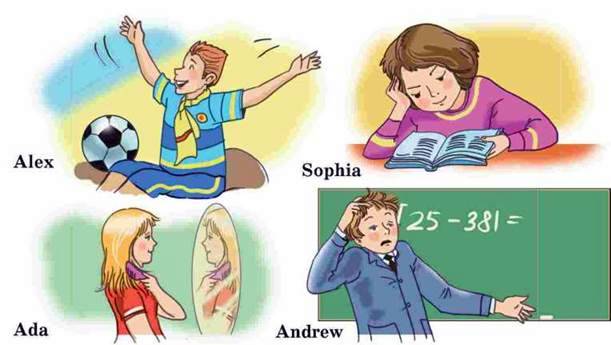
Example: I would like to be friends with Alex because he loves football. I’m also a football fan.
II. Pronunciation Warm-up
Read the chant and practise
MY FRIEND CHANT
– Do you know Andrew?
– Andrew who?
– Andrew Voitenko.
– Of course, I do. He is an old friend of mine. And I like him a lot.
– Do you share his interests?
– Do you have much in common?
– Do you just sit around?
– We certainly do. We are old friends. We are old, good friends.
III. Function Smart
Read and learn how to express devotion to your friend. Look at the pictures and fill in the mini-dialogues.
– Do you know… ?
– Yes, of course, I do. They are devoted friends.
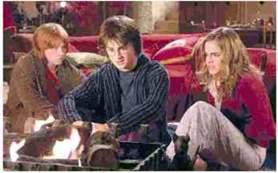
Harry Potter and his friends
– … made new friends in the country of Oz.
– Wow! Isn’t it remarkable?
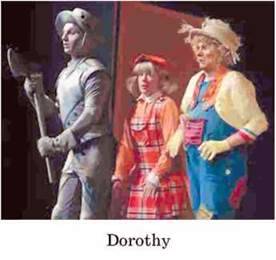
– What do you think of… ?
– I believe they enjoy each other’s company.
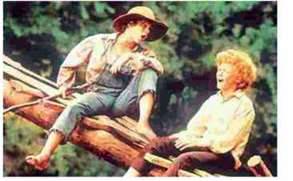
Tom Sawyer
– What do children like to do when they are together?
– They like… . It’s so exciting!
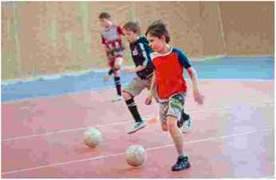
IV. Word Smart
1. Look at the wordsearch puzzle and find six words characterizing a good friend. Make up sentences with these words.
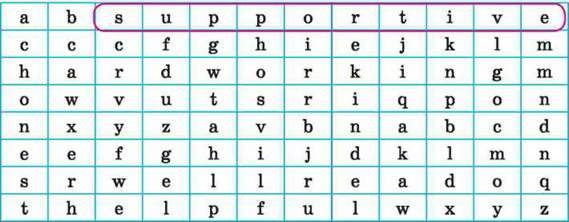
Example: My friend is very supportive.
2. What will you say if:
Example: You have the same interests. → We have much in common.
1. You often see your friend.
2. You like to be with your friend.
3. You got to know a new friend.
4. Your friend can tell interesting stories.
5. Your friend works hard.
6. You met a new friend and liked him at once.
3. Say the same using new words and phrases.
Example: I like to spend time with my friend. -” I enjoy my friend’s company.
1. We both like sports.
2. I often meet my friend.
3. I am in good relations with my friend.
4. My friend reads a lot and knows much.
5. My friend always supports me.
6. My friend helps me when I need it.
At home: Speak about your newest friend covering the following points (p. 31).
1. Who your newest friend is.
2. Where you met.
3. Why you think he (she) is a good friend.
4. How often you get together.
5. What you do when you are together.
6. What you like most in your newest friend.
Go to Ex. 17, 18 of your Workbook
V. Time to Listen and Read
1. Listen to / read in pairs and say why the friends get along.
GETTING ALONG
Ann: Hi, Steve, where are you hurrying?
Steve: I’m going to meet an old friend of mine. It’s Alex Pavlenko from the seventh grade. You know him, don’t you?
Ann: Of course, I do, he is a school chess champion and a top pupil in his class.
Steve: Right. We met at the chess club two years ago and have seen a lot of each other since then.
Ann: So, you share your interests, that’s why you are good friends.
Steve: Not only chess unites us. Alex is well-read and a good storyteller. Thanks to him, I loved Tolkien and Dahl. We enjoy each other’s company and can just sit around.
Ann: It’s remarkable! You can never feel alone with such a friend.
Steve: That’s true. We seem to have a lot in common: the things we like to do and the way we spend our free time. We are both hard workers and good mixers at that.
Ann: I can’t help admiring your friendship and how you get along. A good friend is a joy forever, they say.
Steve: Can’t agree more.
To tell stories – a storyteller To work hard – a hard worker To mix – a good mixer See First Aid Kit, Word Meaning, p. 215 |


2. Complete the sentences with the correct words from the box.
1. Dan likes to eat much. He is such a heavy eater.
2. Jane reads much and she is the best… of my class.
3. Martin has got many friends. He is such a… .
4. My twin brother Andrew spends much time at his lessons. He is a real… .
5. Vera likes to sleep. She is often late for classes.
We call her a… .
6. Mike is not ready for the lesson again. He is a… .
VI. Time to Communicate
1. Act as Steve and describe your friend. Use:
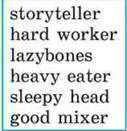
To make friends with somebody;
To share interests;
To see a lot of each other;
To enjoy each other’s company
To be well-read
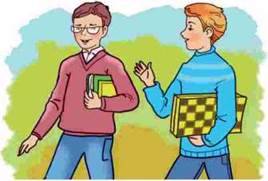
2. In pairs, talk about your friends as in the pattern.
Pattern:
A: Hi, … , where are… ?
B: I’m going to meet… . He is… . You…, don’t you?
A: Of course I do. Your friend is… .
B: Right. We met… and since then…. We really… .
A: So you… that’s why you are such good friends.
B: Not only that. Thanks to… . We enjoy… .
A: It’s remarkable! You can… .
B: That’s true. We seem… and….
A: I can’t help admiring…. A good friend… .
В: I can’t agree more.
3. In the dialogue “Getting Along” (p. 31) find the information for the following chart.
Common Interests | Common Character | Favourite Leisure |
Traits | Time | |
Say what facts from the chart are close to you.
VII. Time to Listen
1. Listen to three children talking about their friends and say why their friends are important to them.
2. Listen again and write the answer for each of the children. Who do you agree most: Taras, Jane or Andrew?
VIII. Time to Write
Read the list below and write which things you expect a good friend to do for you and which things you do for a friend. Explain your ideas.
1. Phone you every day.
2. Listen to your problems.
3. Keep your secret.
4. Remember you birthday.
5. Give you advice.
6. Share the books (CDs).
7. Invite for the concert (movies, museums, walks).
8. To talk about things that worry.
Go to Ex. 19, 20 of your Workbook